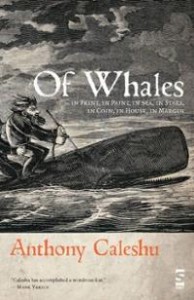 This little book of poetry is a brilliant conceit, with some nuggets of genius and quite a few moments in which the endeavor falls flat. Anthony Caleshu, a New England-born poet currently based in the U of Plymouth in the UK, has taken Moby-Dick and hashed it into a short book of poems. I remember finding the first, and best, of these lyrics in the TLS a few years ago —
This little book of poetry is a brilliant conceit, with some nuggets of genius and quite a few moments in which the endeavor falls flat. Anthony Caleshu, a New England-born poet currently based in the U of Plymouth in the UK, has taken Moby-Dick and hashed it into a short book of poems. I remember finding the first, and best, of these lyrics in the TLS a few years ago —
I am imagining what you are imagining
To be conscious of your head is to be conscious of what it might
hit: a table’s corner, a fire surround. When your head hits my head,
we see a picture of a whale that is not a whale at all…
The book’s full title, from Melville’s chapters 56-7, lay out the poet’s ambition to hitch a ride on the whaleman’s manic journey: Of Whales: In Print, in Paint, in Sea, in Stars, in Coin, in House, in Margins.
The sub-story in these poems appears to involve a father & a newborn son, and at times its cozy domestic drama strains against the Melvillean grandeur. No reason these things can’t be made to fit together — but they don’t, here.
Which leaves the best bits as the most explicit engagements & pastiches of Melville: a great poem that admits that Bulkington “might be our favorite chapter” (30), another on Charles Olson’s “two Moby-Dicks” theory of the late-breaking creation of Ahab (43), some fine descriptive poems based on illustrations from 19c whaling manuals, one of which appears on the cover. Also a concluding plea not to sink too deep into obsession: “We remind ourselves that it is just a book, even if it tells the story of our lives” (66).
My favorite moment concerns Melville’s sister Augusta, left at home with the task of “making fair my brother’s cryptic hand.” She reads with interest an episode in which the crews joys in their triumph over the White Whale. which leads her to make a few changes —
Without Herman looking over my shoulder, and remembering the words of Augustine, it occurred to me that God’s fair hand was only as good as his heavy one. So I duly sunk the Pequod and Ahab and all but the storyteller from the whole heathen crew.
That’s the way to read a great American novel! We should do this sort of thing to other texts. Don Quixote is the obvious choice, or The Tempest, or maybe Cortazar’s Around the Day in Thirty Worlds…
Leave a Reply